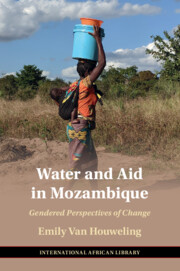Book contents
- Water and Aid in Mozambique
- The International African Library
- Water and Aid in Mozambique
- Copyright page
- Contents
- Figures
- Acknowledgements
- 1 Introduction
- 2 Divergent Development Discourses
- 3 Life before the Handpumps
- 4 Sustainability and Sense of Ownership
- 5 The Politics of Water Access
- 6 Gender Roles and Water Practices with the Handpumps
- 7 Development Encounters
- 8 Conclusions
- Glossary
- References
- Index
- Titles in the Series
5 - The Politics of Water Access
Published online by Cambridge University Press: 18 August 2022
- Water and Aid in Mozambique
- The International African Library
- Water and Aid in Mozambique
- Copyright page
- Contents
- Figures
- Acknowledgements
- 1 Introduction
- 2 Divergent Development Discourses
- 3 Life before the Handpumps
- 4 Sustainability and Sense of Ownership
- 5 The Politics of Water Access
- 6 Gender Roles and Water Practices with the Handpumps
- 7 Development Encounters
- 8 Conclusions
- Glossary
- References
- Index
- Titles in the Series
Summary
In Chapter 5, I take on the question about why only a minority of people in each community used the handpumps. My answer exposes the micro and macro politics of the rural water project and the differences between the water at the well and at the handpump. The handpumps represented hybrid objects produced from an assemblage of modernisation ideologies, global development discourses, social power relations, national and local politics, and local meanings and practices. In the communities, many people felt alienated from this new type of water and the values it represented. The handpumps were framed as a neutral technology that would bring community-wide benefits, yet they were used only by people in the Frelimo political party who lived near the sites and could afford the tariffs. The handpumps entrenched existing inequalities and brought tensions between Frelimo and Renamo into the light. The outcomes of the project were broader and more ambivalent, uneven, and contingent than the project evaluation tools were designed to measure.
- Type
- Chapter
- Information
- Water and Aid in MozambiqueGendered Perspectives of Change, pp. 113 - 132Publisher: Cambridge University PressPrint publication year: 2022

